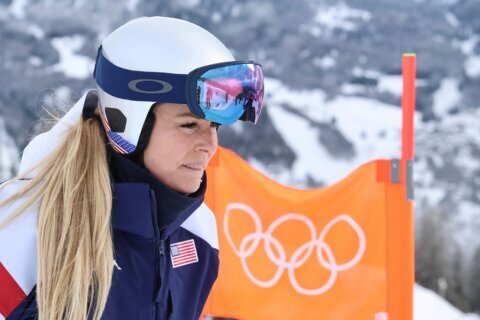There’s no question that it takes nearly divine athletic ability to become an Olympian, never mind a gold medal winner, too. No matter the sport, your body is challenged to do things faster, stronger, more aggressively and more precisely than anyone else in the world can do.
But achieving that athletic glory can’t happen without your mind being in the right place, too.
Tiara Fennell — a professor, therapist and clinic director for the Center for Healthy Families at the University of Maryland (UMD) — says you only need to look back to 2021 for a prime example, when gymnast Simone Biles had to take a break during the Tokyo Olympics to get her mind right.
But this year, Biles is in a much better place mentally and dominating again.
“To see her acknowledge her mental health and really do the work to improve, we are now seeing the results of that,” Fennell said.
Performing in Olympic competitions, or any major athletic event, requires one’s body to not just be in elite condition, but in perfect motion when it’s time to perform. And Fennell said it all starts in your head.
“It’s not just what you put into your body, but it’s also how you’re feeding your soul, how you’re feeding your mind, what kind of information you’re taking in,” she said.
Even if you’re not a star athlete or a famous celebrity, what you do for work or in life still has an important impact on others — even if millions of people around the world aren’t watching you on TV. That makes it important to block out the negative and unnecessary comments or triggers.
“It’s very easy for outside, and sometimes inside, voices and thoughts and opinions to come in and shake your confidence and tell you that you’re not able to do something that maybe you’ve been able to do before,” Fennell said. “It’s very unproductive and, I think, can lead to a very slippery slope, when you start to take in all of these external things, and internalize them and make them about who you are.”
For many athletes, that can mean staying off social media, where other people’s opinions can run the spectrum, reinforcing things in your mind that might not necessarily be true.
“It is important to have folks who can recognize and help you remember who you are, what you’ve been able to do, what you’re capable of,” Fennell said.
Her hope is that the way Biles has been so open about her mental health struggles and how they impacted her will continue to be a turning point in the athletic world.
Mental health is also something that the football coaches at UMD have stressed in ways that haven’t always been common for athletes.
Earlier this spring, head coach Mike Locksley held a mental health symposium at the team’s facility, and the event featured a sports psychologist, counselor, psychiatrist, as well as a pastor. He also helped champion a law that was signed this year in Maryland that requires that all public high school and collegiate coaches in the state receive training to recognize indicators of mental illness and distress in students.
In addition, the U.S. Olympic program draws heavily from college athletes around the country, and suicide is the second leading cause of death among college athletes.
For Fennell, the fact that society is becoming less dismissive about the importance of mental health is encouraging.
Referring again to the struggles Biles had in 2021, which led her to not compete in some events, Fennell argued, “All of the things that went into that, the guilt, the shame, the frustration, the sadness. … Had she not had the right people in her corner, had she not been able to advocate for herself and to really take the time to invest in her mental health, I’m confident that we would not be seeing the type of performance we’re seeing now.”
“So that really gives me a lot of hope and encouragement as a proponent of mental health,” Fennell said.
Get breaking news and daily headlines delivered to your email inbox by signing up here.
© 2024 WTOP. All Rights Reserved. This website is not intended for users located within the European Economic Area.








